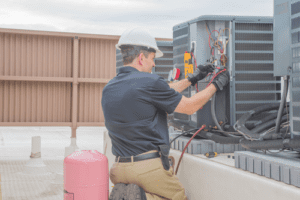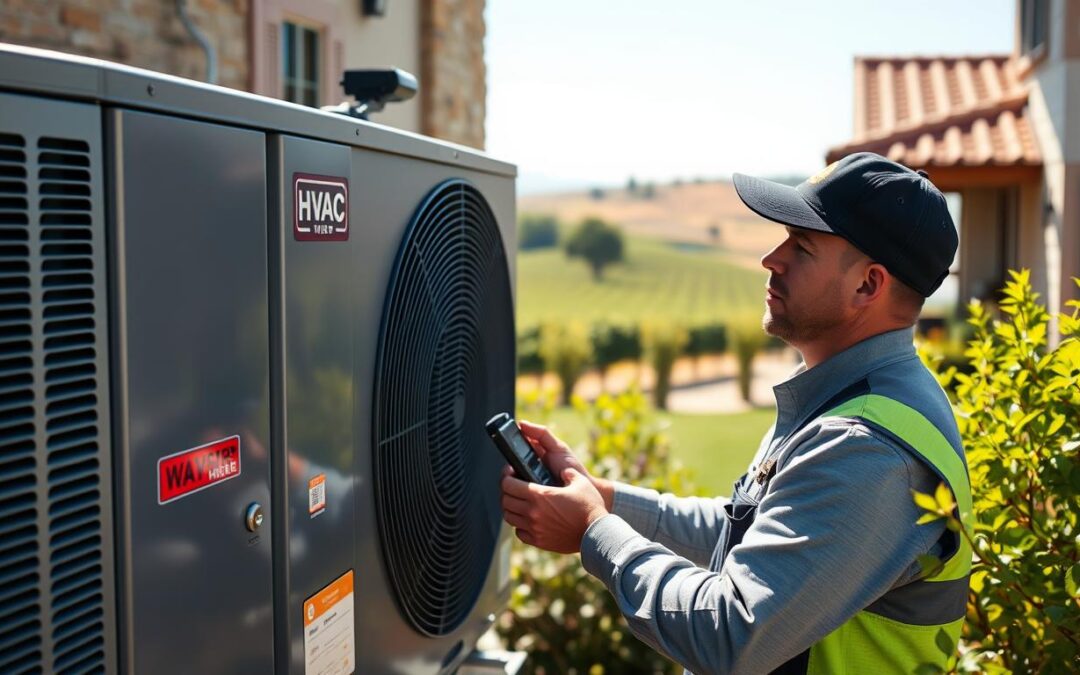Your office, shop, or other commercial space relies heavily on your cooling system during the summer. Don’t think so? Just ask your employees (or, if you’re feeling truly brave, ask some of your regular customers and clients). You’ll probably find that reliable and functioning air conditioning is a priority for all of them. That being the case, it can be incredibly disheartening to discover problems with your air conditioner. One of the most ominous discoveries a commercial HVAC owner can make is to find mold in the air conditioning unit itself. What should you do when such bad luck strikes? Don’t worry: we’re here to help point you in the right direction.
The first thing you should understand about mold is that it is preventable. You don’t have to encounter the unpleasantness that comes with discovering mold in your AC if you can remember to take proper care of it—and even if the worst has occurred, you may find yourself with specific resources. Before we go into any of that, though, we think it’s essential that you recognize exactly how detrimental mold can be—not just to your air conditioner, but also to yourself and the health of your employees.
The Risks that Come with Mold in an Air Conditioning Unit
 What’s the worst part about finding mold in an air conditioning unit? Some people would say it’s that mold is gross and unsightly. Others might mention the potential smell. You might be worrying about the costs of removing the mold from your system and cleaning it out properly. However, all those considerations are less important than the health of the people in your building—which has the potential to suffer if mold is allowed to grow inside an air conditioning system.
What’s the worst part about finding mold in an air conditioning unit? Some people would say it’s that mold is gross and unsightly. Others might mention the potential smell. You might be worrying about the costs of removing the mold from your system and cleaning it out properly. However, all those considerations are less important than the health of the people in your building—which has the potential to suffer if mold is allowed to grow inside an air conditioning system.
The health risks of mold can range from merely irritating to seriously concerning. The following is a list of symptoms you and the people around you may begin to experience if mold has been present in your air conditioner for a significant length of time:
- Unpleasant skin reactions: itching, swelling, and redness can all be signs of a mold outbreak.
- Eye irritation: you may find your eyes watering, itching, or blinking rapidly.
- Respiratory illnesses: mold can cause coughing and wheezing in otherwise healthy people, and can exacerbate the symptoms of people with asthma. It may even cause healthy people to develop asthma—particularly children.
Why Mold Forms in AC Systems
Many people are baffled when they first discover mold in their air conditioners because they are careful about maintaining their cooling systems. They might change the filters religiously every month, arrange for duct cleaning every 2-5 years, and have a long-term service contract with a licensed HVAC technician in their area. All these strategies are important, and they can each mitigate the chances of fungus growing in your AC. However, it should be noted that mold can still find its way into your system. After all, mildew naturally grows in any place where there is enough moisture, especially if that area is dark and enclosed. As such, air conditioners are high-risk places for mold to grow, because they often do not run for sizable portions of any given year.
How to Deal with AC Mold
Now that you understand the health risks of mold in your air conditioner, it is vital that you know what to do if you find it growing in your system. The following list of actions can help you deal with mildew as best you can:
- Turn off the air conditioner to prevent it from circulating spores throughout the building.
- Wear a mask to prevent yourself from breathing in spores and instruct anyone else in the building to do the same until the problem has been resolved.
- Use a wet vacuum or a rag to remove any moisture that you can see in or around the system.
- Purchase mold products that are explicitly safe for use in AC systems. These can often be found at home improvement shops in most local areas. Then clean the area where the mold has grown, and make sure not to miss anything.
- Consider buying a special mold-reducing filter to prevent the mold from returning. After all, if it grew there once it will probably do so again (unless you change something).
- If you are unsure of your ability to perform any of the steps above, call a licensed HVAC contractor who will be able to clean the mold out of your system and put measures in place to prevent a recurrence.
The Role of Indoor Humidity in Mold Growth
Let’s talk about something most people overlook: humidity levels inside your building. Mold in AC units doesn’t just magically appear—it thrives when indoor humidity levels hang above 60%. Even if your air conditioning is top-notch, high humidity can still create the perfect environment for spores to grow.
A simple fix? Install a hygrometer (they’re cheap!) and monitor your indoor humidity regularly. Aim to keep it between 30%–50%. If your space struggles with moisture—especially in basements or older buildings—consider investing in a commercial-grade dehumidifier. It’s a proactive step that’ll save you major cleanup costs later.
UV Lights: Your Secret Weapon Against Mold
Here’s a high-tech trick that HVAC pros swear by: UV-C lights installed inside the air handler. These ultraviolet lights are designed to kill mold, mildew, and bacteria before they can spread through your ducts. Think of it as setting up a microscopic security guard inside your AC system.
According to the ASHRAE (American Society of Heating, Refrigerating and Air-Conditioning Engineers), UV lights can reduce airborne contaminants by up to 99% when properly installed. For offices in humid climates, this small upgrade could mean a huge difference in air quality and health.
Annual AC Mold Inspections Are a Game-Changer
Prevention is the name of the game—and the best way to stay ahead of mold issues is with a yearly AC mold inspection. Most commercial building owners skip this step, but it’s a goldmine when it comes to early detection.
During these inspections, a certified HVAC technician can:
- Check drain pans for standing water
- Inspect ductwork for bio-growth or water damage
- Evaluate your insulation and air sealing
- Suggest upgrades like mold-resistant filters or coil-cleaning treatments
Plus, these inspections often catch airflow issues that may be increasing indoor moisture—a major mold magnet.
Take Mold in the Air Conditioning Unit Seriously
Fungus in an air conditioning unit is never good news, and it has the potential to be a real liability. Refer to this guide if you ever suspect that mold is present in your system and follow the steps above to handle the problem.
Check with us here at Valley Comfort Heating and Air, our customers love our attention to detail and our friendly, affordable service. (707) 539-4533



